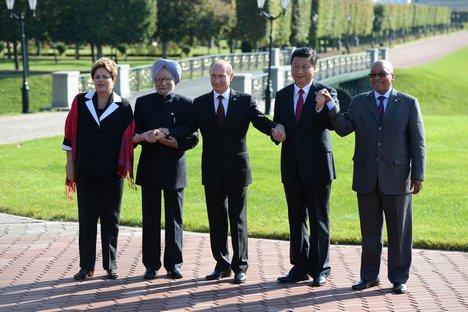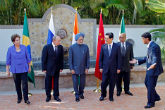
Meeting of the BRICS leaders at the G20 summit in St.Petersburg. Source: RG
“The initiative to establish a BRICS currency reserve pool is in its final stages,” Russian President Vladimir Putin said when opening a meeting of the group's leaders held in Russia's St Petersburg on the sidelines of the G20 summit last week. A little later, Deputy Finance Minister of Russia Sergei Storchak told journalists that the funds for the pool would be taken out of the Central Bank's international reserves.
The size of the reserve fund - $100billion – was actually determined back at the BRICS summit in Durban (South Africa) in March. At that time, BRICS even reached a preliminary agreement on proportional contributions to the pool, with China contributing most - $41 billion, Brazil, India and Russia putting in $18 billion each, and South Africa adding the remaining $5 billion. Storchak explained that the central banks of the BRICS countries had agreed to allow prompt currency swaps if required. “A national currency will be backed by dollar injections from the group. That is, the Central Bank will extend a dollar amount to a member state that requests it, subject to repayment, interest and maturity conditions. The fund is being set up to enable the countries to respond promptly to any developments on the foreign exchange market,” the deputy finance minister explained. BRICS finance ministers have been asked by their respective presidents to continue working on the idea and report back at the upcoming BRICS summit in Brazil next year.

BRICS leaders to meet on sidelines of G20 summit in St. Petersburg
Economic slowdown in BRICS temporary – Kanwal Sibal
Putin calls for bigger BRICS role in IMF, criticises European welfare model
The pool will be the second financial institution created by the group, with a Development Bank with $50 billion in capital already in the pipeline. At their meeting in St Petersburg, BRICS agreed on the decision-making process for the bank's key operations. According to Putin, the process will be consensus-based. The bank's capital will be made up of allocations from national budgets, meaning that the bank will be established using BRICS taxpayer money.
Emerging nations are putting in more effort to develop their versions of the World Bank and the International Monetary Fund against the backdrop of mounting criticism of the BRICS and increasing capital outflow from developing markets in general. To illustrate, in a report prepared for the G20 summit, the IMF indicated that, in the near term, the “impulse to global growth is expected to come mainly from the United States.”
Brazil and India are already facing serious problems in stabilising their currencies, since they are hard-pressed to maintain growth by encouraging domestic demand because of the generally high poverty levels. The Russian rouble has also depreciated considerably since the beginning of the year but the trend has been interrupted by the Syria crisis, which has pushed oil prices up. As for China, while the government has managed to ensure exchange rate stability through strict regulatory measures, according to the World Economic Forum experts, it is losing its main economic advantage: a cheap labour force. China now comes only 29th in the World Economic Forum's Global Competitiveness Index, with South Africa lagging behind in 53rd place, Brazil in 56th, India in 60th, and Russia in 64th position.
Yet certain positive trends are still out there. At least two national currencies of the BRICS members are picking up weight in global trade. For instance, in the estimation of the Bank of International Settlements based on opinion polls among representatives of central banks, commercial banks and governments of 43 countries worldwide, China's yuan has, for the first time, joined the top ten currencies in terms of the volume of operations on foreign exchange markets (9th place). While the dollar, which has dominated the market for a long time, still accounts for 87 percent of all foreign exchange deals, the yuan has garnered 2.2 percent of the market. The rouble has also come a long way from 18th place in 2007 to the 12th place in trade turnover (1.6 percent of the market) in 2013.
Of all the emerging market currencies, the rouble only lost to the yuan and the Mexican peso, with the Brazilian real and Indian rupee accounting for 1.1 percent and 1 percent of the market, respectively.
While establishing a reserve fund was generally hailed as a good idea, experts polled by the RIR added, however, that its projected size would obviously be stretched to resolve the existing problems. “The amount would probably suffice to balance the short-term impact of capital outflow and enable national regulatory authorities to respond more effectively and we will not now be seeing the rupee and the real plummeting so steeply,” Vladimir Lupenko , a partner with FCG said. Even so, he does not expect the reserves to be enough to rein in exchange rates in the long term. “The money might also be enough to limit pressure on the national currencies as the quantitative easing programme is brought to a close (by the US government), which is sure to push the dollar back up high. Meanwhile, it is not just about the amount of the reserves but also about the Federal Reserve's plans to wind down 'financial stimuli.' Inaccurate estimates could easily cause this complex and unique process to run out of control,” Lupenko added.
Investment expert Timofei Sholtes, in turn, opined that although definitely a good initiative, the reserves would fall short for keeping the national currencies stable, arguing that the MSCI Emerging Markets Index had already fallen by 5 percent by September 2013, far beyond the $100 billion in absolute terms.
“Considering the political resistance coming from the IMF, the World Bank and developed economies, the resources may prove ineffective because of their inadequate size. Meanwhile, the amount is quite enough to challenge international financial institutions, which impose stringent political conditions on low interest loans to developing nations,” Sholtes observed.
All rights reserved by Rossiyskaya Gazeta.
Subscribe
to our newsletter!
Get the week's best stories straight to your inbox